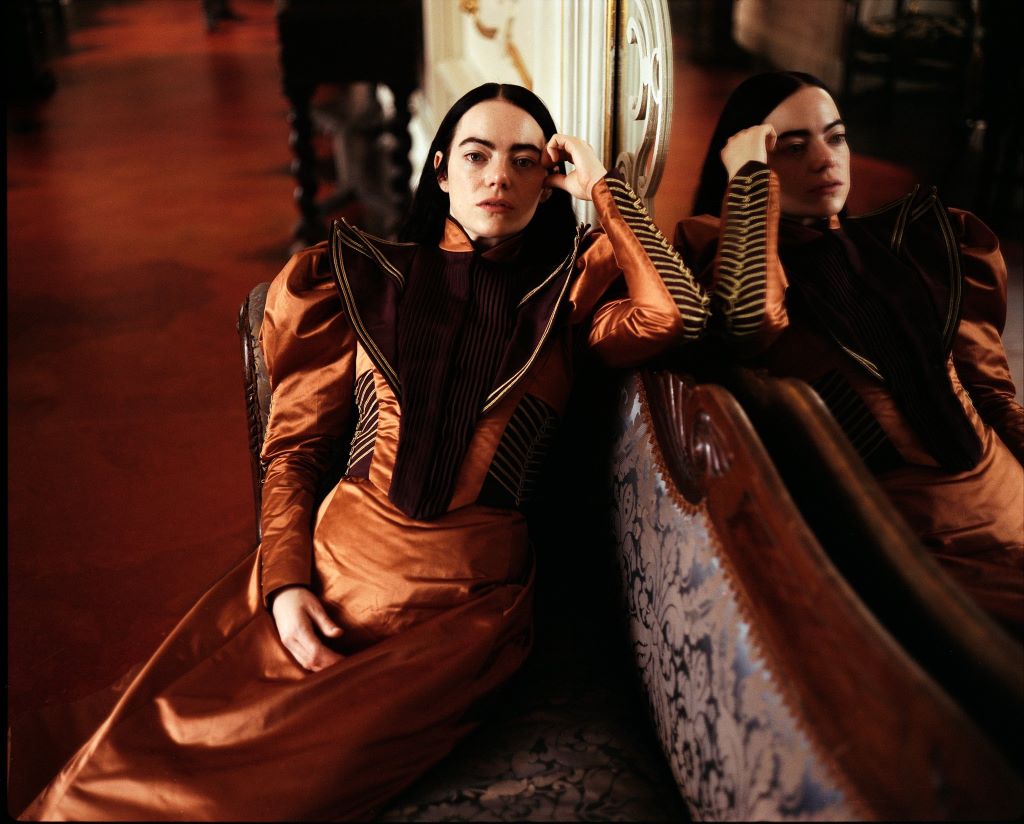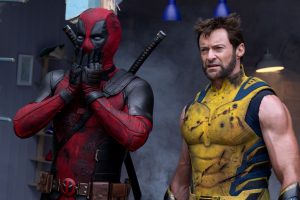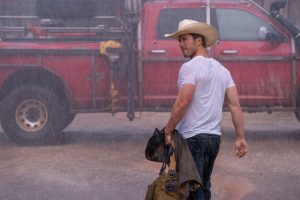Reviews include Deadpool & Wolverine, Doubles, and Mountain Queen: The Summits of Lhakpa Sherpa.
TFCA Friday: Week of Dec. 15
December 15, 2023

Welcome to TFCA Friday, a weekly round-up of film reviews and articles by TFCA members.
ICYMI: We are now accepting applications for the Telefilm Canadian Emerging Critic Award.
And stay tuned for the TFCA Awards announcements coming this Sunday, December 17 beginning at noon EST with winners and nominations posted on X.
In Release this Week
Chicken Run: Dawn of the Nugget (dir. Sam Fell)
At Afro Toronto, Gilbert Seah calls it “the perfect Christmas film – silly, smart, very British and mostly free (if one has Netflix).”
Immediate Family (dir. Denny Tedesco)
“Immediate Family is a boomer’s delight; a portrait of The Section, legendary backup musicians -drummer Russ Kunkel, bassist Leland Sklar, and guitarists Danny Kortchmar and Waddy Wachtel – who gave character to music for a who’s who of modern American rock. Carole King, James Taylor, Phil Collins, Linda Ronstadt, Stevie Nicks, Keith Richards, Don Henley, David Crosby, Jackson Browne, Lyle Lovett, The Everly Brothers, David Crosby, Warren Zevon, Jimmy Buffet, anyone who was anyone over the next decades benefitted with their support,” writes Anne Brodie at What She Said. “Peter Asher (Jane’s brother), their producer was the first to credit the backup musicians on liner notes.”
“[M]ost of this easygoing film is history: The story of how they made their way to Los Angeles, how they met, and what they saw in each other as musicians and as human beings. There are testimonials from a number of key musicians, Phil Collins, Lyle Lovett, Linda Ronstadt, Stevie Nicks, Keith Richards,” notes Karen Gordon at Original Cin. “There are few bumps in the road, for some of the members, including a touching admission by the bass player Sklar about his deep shyness. But there’s nothing very groundbreaking or controversial here. This is essentially an affectionate documentary about a group of killer musicians, who are still working and obviously loving what they do and each other.”
Jacob the Baker (dir. Rev Miron)
“Despite the filmmaker’s good intentions, the film tries too hard and has little confidence in the power of its content,” admits Gilbert Seah at Afro Toronto. “The audience is often played down, preached to, and treated as needy.”
Poor Things (dir. Yorgos Lanthimos)
“Stone shoulders the weight of the film handily, as the Oscar-winner impressively flows from toddler to mature woman with a paradoxical in-your-face subtlety that’s fascinating to examine as an acting exercise,” writes Rachel Ho at Exclaim!. “Never playing the fool, Stone instills a sense of respectable curiosity to Bella that invites audiences to forfeit any unnecessary sympathy for the character. Not to be outdone is the physicality Stone brings to the film that elevates the script from biting to a deeply felt experience.”
“Bella states her needs and fulfills them, without guile, a pure soul or something like it and drives men mad, an early feminist, able to meet and surpass men. The magnificent Hannah Schygulla appears briefly as an experienced older woman, an ally for Bella as she blasts through the screen,” notes Anne Brodie at What She Said. “The art direction, textures, colours, and heightened sensuality are truly stupendous. It’s unmatched as a visual experience, not as jolly as Lanthimos’s The Lobster, but exquisite, clever, reasonable, and masterful, whisking us away to new ideas, but be warned, it’s a lot. I smell plenty ‘o noms.”
“This is one of my favourite Willem Dafoe performances, which is saying something. And Mark Ruffalo, plays Wedderburn with a faux upper crust, British dandy accent. And his way of telegraphing his character’s bad intentions, and his comic timing is a complete and total delight. The great Kathryn Hunter is also terrific as the madame of a Paris brothel,” writes Karen Gordon at Original Cin. “But this is a movie with much more going on. Lanthimos is a master satirist. And satire, of course, is by definition edged in some kind of cruelty. This leads us to the pathos of what’s going on underneath it all. And that is also present in Poor Things.”
“The narrative picks up when Bella, whose brain is rapidly maturing, decides to run off to the Continent with the scoundrel Duncan Wedderburn. The landscape and mechanical devices take on a steam punk look as Wedderburn, a fatuous lawyer and awesomely successful lover, shows Bella an astonishingly good time in Portugal—a land of fado and butter tarts—and Egypt before their adventures began to unravel,” says Marc Glassman at Classical FM. “Initially a shuffling inarticulate creature, Bella has matured by this time into a dancer and reader of fine literature while remaining naïve. After she gives away a fortune, the pair arrives destitute in Paris, where Bella pursues her destiny as a high-class prostitute as Wedderburn falls apart psychologically and physically.”
“Blessedly, the overriding smugness is balanced by a trio of excellent performances from Stone, Dafoe and Ruffalo. They understand the assignment, and strap their dunce caps on with glee,” says Barry Hertz at The Globe and Mail. “Stone especially runs away with things as the literally woke heroine, her ambiguously developed mind expanding at an intimidating pace as she explores all corners of the world, and all four posts of a bed. And though Stone is required to be naked and/or having sex every other scene, the actress’s confidence in her character’s intentions and extremely specific world view burns with an own-it sense of autonomy that strips away any concern of directorial exploitation.”
“The film with an adapted script by Tony McNamara benefits from a simplified story from the novel,” notes Gilbert Seah at Afro Toronto.
“Composer Jerskin Fendrix, cinematographer Robbie Ryan and the film’s production designers, art directors and costumers rise to the challenge thrown down by Lanthimos and actor/producer Stone,” adds Peter Howell at the Toronto Star. “These inspired craftspeople stitch together a crazy quilt of sound and images — Ryan again uses the fish-eye lens he employed for the palace antics of The Favourite — to create a retro-futuristic world of flying trolleys, bulging boats, hybrid people and animals, and vibrant Van Gogh skies. Poor Things resembles a cake made by an insane baker.”
The Sweet East (dir. Sean Price Williams)
“Ryder’s Gen-Z Lillian is so fed up with her daily grind she’s willing to confront, just for kicks, neo-Nazis, religious freaks, murderous conspiracy theorists and overzealous indie filmmakers,” notes Peter Howell at the Toronto Star. “All of them are encountered on an eastern U.S. road trip that, with anyone less self-assured than Lillian, Ryder’s breakthrough role, might rightfully be viewed as a series of abductions. Featuring a script from the sharp pen of film critic Nick Pinkerton, “The Sweet East” was a pleasure to discover at Cannes 2023.”
Wonka (dir. Paul King)
“Oompa, Loompa, doom-pa-dee-do / Oh, I have more critiques for you / Oompa, Loompa, doom-pa-dee-yay / There are better kids movies this holiday,” sings Barry Hertz at The Globe and Mail. “Chalamet seems to be a Gene Wilder fan / But he can’t live up to the original candyman / He’s flat, and he’s grating, and he can’t sing a tune / The heartthrob is best off on the sands of Dune.”
“In the early going of Wonka, Chalamet comes on like a latter-day Dick Van Dyke in Mary Poppins, getting by on his endless energy and willingness to please. He sings about as well as Van Dyke, which means he can sort of carry a tune, but he can’t dance nearly as well as the master. This becomes a bit of a liability as the show drags on,” agrees Peter Howell at the Toronto Star.
“Wonka succeeds in keeping the delightful spirit of the original Willy Wonka and the Chocolate Factory alive with colourful characters, and catchy songs in a humorous fairy tale adventure setting,” writes Gilbert Seah at Afro Toronto.
“The amazing thing is that Chalamet manages to make something out of almost nothing, imbuing his young daydreamer/chocolatier with a wistfulness that gives the illusion of three dimensions. Pure imagination indeed! … Wonka would have melted the career of a lesser thespian,” says Chris Knight at Original Cin. “But behind this questionable character sketch – not to mention those of the three equally evil chocolate magnates who are Willy’s main nemeses – lies the quandary of whether the world even needs this prequel at all. The last decade has given us a plethora of unnecessary backstories – Cruella, Solo, Maleficent, Oz the Great and Powerful, etc. Do we really need to know how Willy became Wonka? Or to learn that much of the transformation was caused by that hoary cinema standby, Missing Mother Syndrome?”
“King creates a vibrant world filled with contraptions and flights of fancy. Children will undoubtedly be in awe of the dynamic visuals and delight at watching a diverting heist go down, but it’s Wonka‘s generation-crossing sense of joy that makes it compelling,” says Rachel Ho at Exclaim!. “Wonka brings us back to a time when adventure was at our front door and we only had to pack our imaginations — imploring us to simply look around, do what we want to do, and change what we want to change. After all, there’s nothing to it.”
At the Toronto premiere for Wonka, Marriska Fernandes chats with star Timothée Chalamet for the Toronto Star about redo-ing the classic movie: “It felt like the Paddington films that the director (Paul King) had done and I was a big fan of. I thought, weirdly, to do something so sincere and joyous is less normal now,” says Chalamet. “Maybe 60 years ago it would have been something. So I wanted to switch it up.”
File Under Miscellaneous: American Graffiti at 50, Catching Up with Rojek, and Why Zone Is 2023’s Best
At Zoomer, Brian D. Johnson looks back at George Lucas’s American Graffiti upon its 50th anniversary: “Graffiti is a costume picture in which the costumes are cars. It’s an early glimmer of the Cinema of Things, where movie stars would be enveloped and upstaged by the invincible glamour of wearable tech – as a Terminator or Iron Man or blue-skinned alien – and every blockbuster would become a toy story,” writes Johnson. “Spielberg created the phenomenon of the summer blockbuster with Jaws in 1975, but it was Lucas who forged the prototype for the blockbuster machinery that would upend the business and culture of making movies. Frustrated by his battles with the studios over Graffiti and Star Wars, he colonized their turf, carving out creative and financial control while building his own dream factory of special effects – Industrial Light & Magic. Lucas was not only the Henry Ford who scaled up Hollywood’s last industrial revolution, he was the Steve Jobs who ushered in its digital revolution. For better or worse, he reinvented cinema as a techno medium that led to the world-building supremacy of James Cameron’s Avatar and the superhero monoculture of the Marvel Universe.”
At What She Said, Anne Brodie catches up with Canada’s Oscar submission Rojek and thinks that you should too: “One stunning reality after another in what seems to be a burning hellscape of ancient repressive laws. [Zaynê] Akyol also followed a female military unit in Syria that fights ISIS seeking to establish an inclusive, feminist state. The filmmaker later discovers all but one were murdered. Rojek is fascinating, ugly, raw, and real; we need to know.”
At the Toronto Star, Marriska Fernandes chats with Maestro director/star Bradley Cooper about bringing Leonard Bernstein’s story to the screen: “I have never made art as fearlessly,” Cooper said. “His story forced me to be fearless because he was. That was the biggest gift that Lenny gave me…as much as the director is controlling everything and creating the environment … it has to be real, it has to feel like it’s happening for the first time … that not knowing what’s going to happen is always thrilling. So that’s like just acting in and of itself.”
In advance of next week’s release of The Zone of Interest, Barry Hertz speaks with director Jonathan Glazer at The Globe and Mail about his research process, including mirroring the haunting Auschwitz setting: “I certainly was surprised when I went to the camps for the first time and I was given permission to see the house of the commandant, and its garden,” says Glazer. “It was a garden that abutted the camp’s wall. It’s real. That proximity was staggering. And that became where I wanted to set the story – on one side of the wall, where we can only hear what’s happening on the other side.”
At The Globe and Mail, Barry Hertz picks the best films of 2023. Atop the list? The Zone of Interest: “As deeply chilling as it is precisely engineered, director Jonathan Glazer’s masterpiece is the perfect film to close out 2023, a year of blind eyes and buried heads. Very loosely adapting Martin Amis’s 2014 novel of the same name, The Zone of Interest follows the domestic routines of a husband (Christian Friedel) and wife (Sandra Huller) as they go about their days, running the household and raising children,” writes Hertz. “Except the household is in the literal backyard of Auschwitz, the year is 1942 and the husband is SS commandant Rudolf Höss. Not so much about the banality of evil as the pernicious selfishness that fuels moral decay, Glazer’s film is a knockout in all senses of the word: It will flatten your soul, and it cannot be missed.” Hertz also picks 10 films that deserve a closer look.
At Zoomer, Marriska Fernandes chats with Rustin star Colman Domingo about getting into character to portray activist Bayard Rustin: “I think it’s still a part of me. I think that when I saw a screening of the film, I felt emotionally very connected to it because I went to probably deeper places,” he said. “This was something that was really right under the skin and it’s in a really tender space with me because I wanted to maybe give a part of myself as well that’s in Rustin and finding that Rustin in me in the way we made it.”
At Sharp, Marriska Fernandes chats with the Candy Cane Lane team about having good times on set with Eddie Murphy. “Eddie is hilarious. But what makes everyone around him hilarious is [that] he’s a really generous actor. It’s not all about Eddie being the funny person in the scene,” Tracee Ellis Ross tells Fernandes. “For Eddie, it’s about grounded-ness, which is why I’ve loved his comedy for so long — it’s not based on being funny, it’s based on being real. A connection has to be there for it to come across in the right way. And that’s what he does. He’s not sitting there trying to get you to set up his jokes. He’s actually in a scene playing with you. That’s what makes it fun and that’s what makes it work.”
TV Talk/Series Stuff
At What She Said, Anne Brodie gets in the yuletide spirit with the holiday special for Vera: “The story seaside setting of the wild place adds drama, as ever, and the show continues to excel in its writing, direction, cinematography, and the magnificent [Brenda] Blethyn. And yes indeed Christmas comes!”



